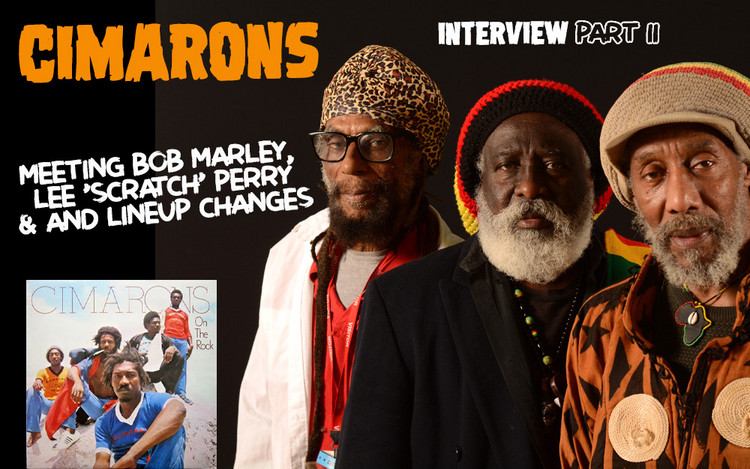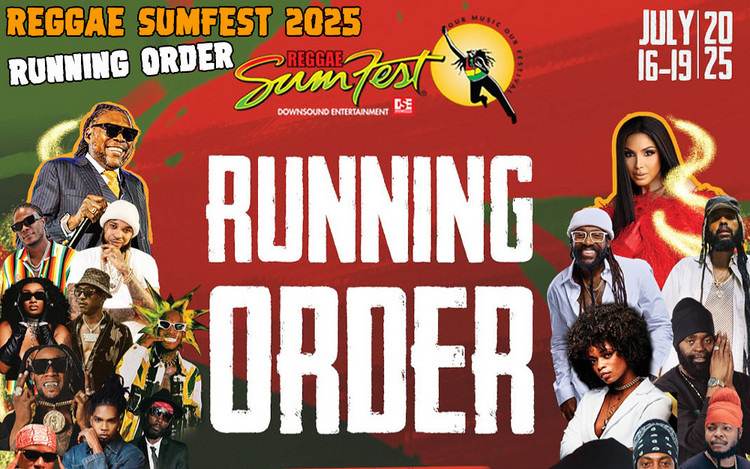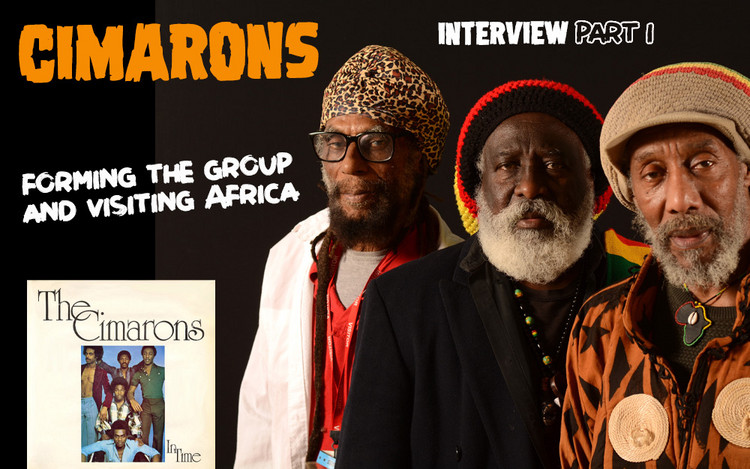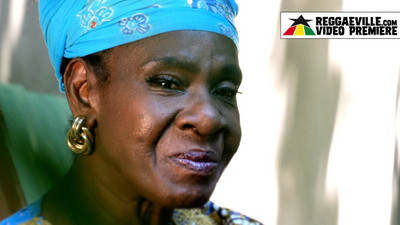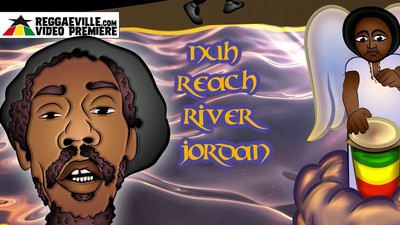Taj Weekes ADD
Taj Weekes - The 'To All My Relations' Interview
12/28/2018 by Angus Taylor
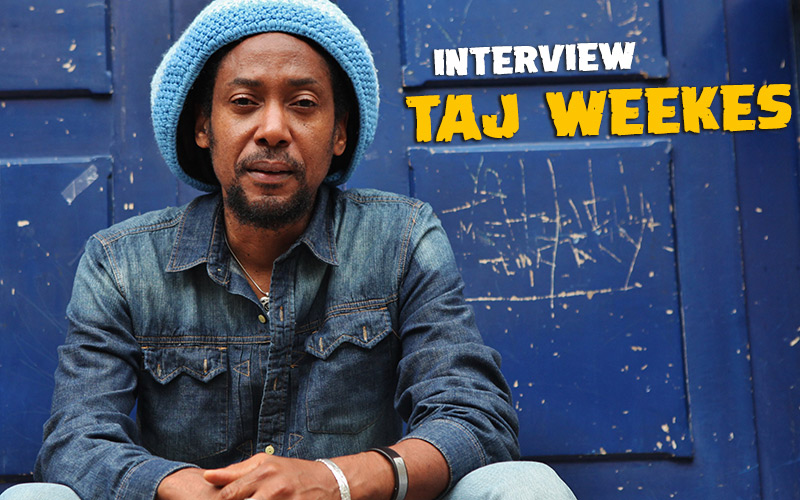
Across six albums, New York-based St Lucian singer-songwriter, poet and activist Taj Weekes has trod his uncompromising path in roots rock reggae. Throughout, his works have maintained their unabashed intellectualism, poetic conceits, and a conviction to tackle difficult and bleak subjects.
He delivers his songs over his band Adowa’s music: a music that updates the rebellious pulse of the Wailers, minus all clichés. He delivers them in a voice that is without age or gender: as soothing and sweet as coconut water; as detached and haunting as a ghost.
In October he released latest album, To All My Relations. It was produced by Sidney Mills of Steel Pulse, and was inspired by Weekes’ experiences visiting Cuba and protesting at Standing Rock.
Angus Taylor spoke to Taj on the phone in New York, over the barking of his dog. During this lengthy but rewarding interview, they discussed his journey from St Lucia to the USA, the inspirations for his music, his views on politics in America, and why he isn’t bothered by accusations of elitism anymore…
Where in Saint Lucia were you born? What did your parents do for living?
I was born in Castries, at the Victoria hospital but I lived in what people call the capital of St Lucia in the little part of Castries called George Charles Boulevard. My mom was a stay at home mom and my dad was a plumber. My dad was one of the few people who had almost like a government contract, so [worked on] all the schools and all the upcoming developments, because there were some expats who were building new houses. My dad did fairly well as a plumber. The Boulevard was like this circular place where a large set of people live. The soccer field was around the corner - football field - you can tell I’ve been in America too long! (Laughs) My dad was one of the only two people with a car when I was growing up so he was fairly popular!
In your recent interview with the Spectator you said your father did a bit of singing at home…
There would be nights where we would be sitting outside on the front porch and he would come around the corner and to entertain my mother he would pretend that he was drunk and pass the house and he would come back and start singing. At home at night time we would line up in the living room and we would sing to our parents, right around 7 o’clock after we had our supper. We were singing Sly and the Family Stone, Jackson 5, stuff that was popular. And then he would get up and he would sing an old Nat “King” Cole or some Brook Benton. I’ve told people that it’s only in retrospect but I realise that he was actually teaching us how to breathe. He had the technique down. He exaggerated his breaths in between and over a period of time you realise “Oh that’s how you breathe while you’re singing”. Because as children you would always sing and you still hold your breath.
Were you a big reader from a young age?
I always liked my English classes. I met my English Lit teacher on my last trip to Saint Lucia and he was telling me that I was always very curious. When the other kids were running away from Macbeth I was one of the few that were kind of excited about it. The thing is in Saint Lucia when you’re in school when you’re taught you’re kind of almost forced. When we’d come to school in the morning we’d line up before we going to class in a straight line. The teacher would say “Okay - spell Wednesday“ and everybody was spelling it the same way it sounded but I remembered the WEDNES-DAY because I didn’t want to get spanked, so I always studied so I would be prepared.
When I was 13 I got a chance to be on the radio station so I would get up early and put out the [album] jackets and I would read the lyrics. And I realised I always liked to read lyrics. Even with my brothers when we sang together, these guys always sang the wrong lyrics and it really pissed me off! So when I started complaining they said to me “Well you write them down”. So I would meticulously listen to the record over and over to write the words down, so I kind of was always interested in words.
How did you end up being a Disc Jockey on local radio in Saint Lucia?
Well some lady came into the school that I went to and they used to have a programme where they were trying to give young people a voice. So they came in to the school and they said “We are starting up a radio programme - how many of you are interested? The ones who are interested - write down two choices”. And I wrote down “DJ” twice! So she said “No - two choices”. I said “If I can’t be the DJ, I don’t want to be any part of it”. You see, I was a little bit known because I used to do stage shows. I wasn’t playing in instrument. We were singing soul songs on whatever shows we could get a chance. So I guess I kind of got away with it a little bit when I wrote DJ twice.
People talk about Jamaica’s disproportionate influence worldwide musically. But similarly Saint Lucia really punches quite hard in terms of its intellectual and literary achievements. It has two Nobel Laureates in Derek Walcott and W Arthur Lewis. Did you imbibe that at all?
Well I guess it really was an island thing. We were so proud of the two guys who had done what they had done that almost indirectly they were always looking for the next one. And you were told about these brothers so much that you would like to be the next one because they are the quiet famous ones. They don’t have to say much. Everybody knows they’re there and they get all the props. If Derek Walcott showed up anywhere when he was alive the whole island would lean towards that side. So yeah I guess I was. I guess every child on the island is still.
Did you write poetry when you were younger? How did that start?
Yes. I wrote poetry when I was younger. From English Lit. I was just trying to put things together because I’d been spending so much time reading these lyrics. The whole overall idea of a song fascinated me. You can put some words together, get a melody, put music to it and something good could come out of it. I wrote some terrible poems when I was younger where I don’t even want to see them now! I remember writing a calypso song about Independence, something about “Today we’re going to get our independence and we’ll have our own helicopter” and just silly things. And I wrote a terrible love song called JC Come Back. Wow! It was really cheesy!
When would you say you first became socially conscious?
Two incidents stand out in my mind. The first one was an indirect awareness. My dad used to take the kids in the area to the beach on Sundays. He had one of these wagons with the wood down the side. We would jump in the car and one day, I came to the car late and I had to sit in the back. I’m the last in the family so I was a little spoilt. I got away with stuff my older siblings couldn’t have gotten away with.
I remember sitting in the back and I was really angry and I got to the beach and my father said “What’s wrong?” And I said “Well I had to sit in the back”. And he looked at me like “What’s wrong with sitting in the back?” And I said “Well you are my father, how come I am sitting in the back when some strange kid from around the block is sitting in the front?” And he said to me “We are all equal. Sometimes you get to sit in the front, sometimes you get to sit in the back”. And basically told me to suck it up. And then I kind of started realising “What’s the big deal? We’re all the same person”. Because you always have that thing like “If my dad is the one with the car, we’re one of the better off kids in the neighbourhood” but he kind of just brought me back down to size.
And then when I was growing up, when I was sent to buy bread my mother always made me buy extra loaves. I didn’t know why but when I woke up in the morning they were never there. I thought my siblings had been eating them in the night. But then when I grew up a little more I realised that my mother was giving bread to the neighbours who could not afford it. And then when the ladies came down from the countryside she always had extra food to give them. So I was kind of always aware of the discrepancies you know? And how my mother and my dad always treat people right regardless of where they were on that social ladder. But I think my awakening came when my brothers grew their locks. 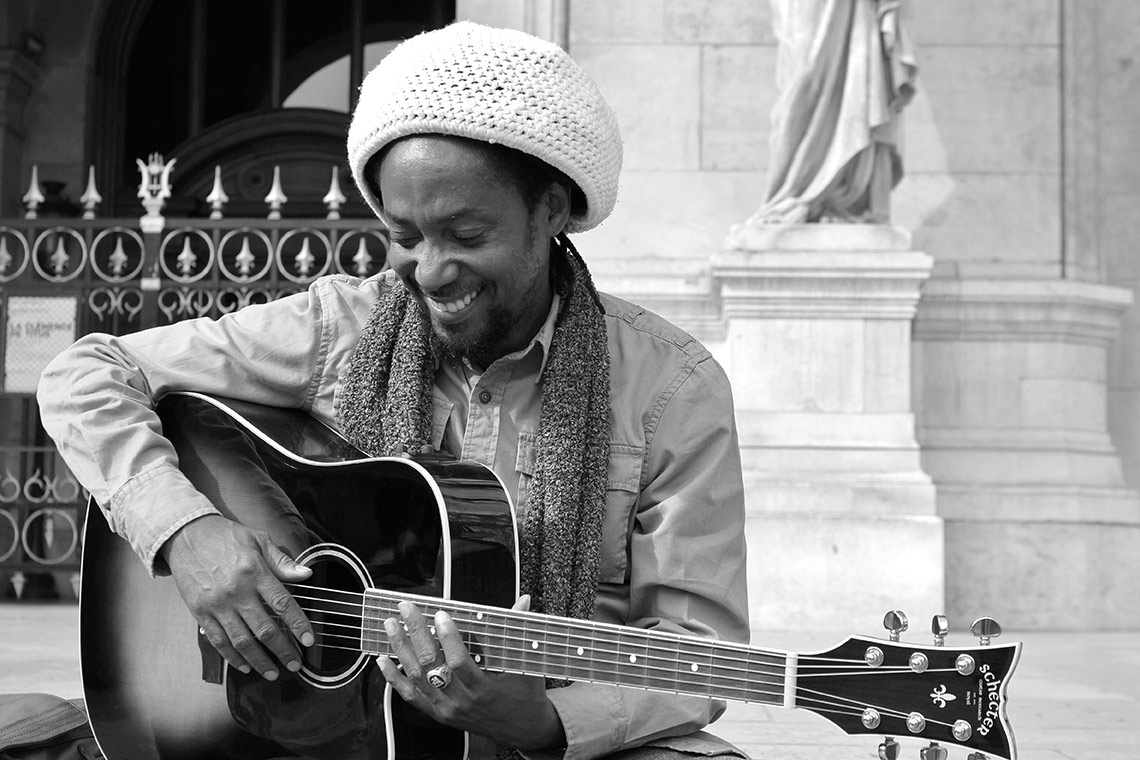
How did Rasta come into you and your brothers’ lives?
It was really different when my brother started growing locks. My mother grew up in a different church but when I came around she was going to the Pentecostal church. I could sing every song in that song book without even opening it up. Mom and I would walk to church and on our way we would sing together. But there was a picture of Jesus over our door - you know the blond hair, long staff - and my brother was always upset that we had that picture and I never really understood. They always covered their hair before they came in the house because my mother couldn’t deal with it, she didn’t want to see it. And then one day my brother sat me down and spoke to me and explained the difference in philosophy and how our outlook on life should be that we should be our brother’s keeper and that we are all the same. We need to move collectively together because if we didn’t and certain people fell back it wouldn’t be fair for the entire movement. And that’s kind of when I started seeing things differently.
Were there any Rasta elders around that were an influence on yourself and your brothers?
Yeah there was a brother called Mosiah Kanna who I remember clearly. Mosiah Kanna was a St Lucian brother who had to go I think to Saint Croix. He was either a doctor or a lawyer but he came back and he was a Rastaman and I remember my parents and the other ladies in the neighbourhood talking about the disappointment that this was what he came back as! He used to ride a horse in the ghetto and he was always preaching almost kind of like John the Baptist. One time, this incident kind of stayed in my head, the police came into the neighbourhood and he was on his horse and the police officer punched the horse and knocked the horse out and Mosiah Kanna fell off the horse and I think he was arrested. But these were the elders who came through all the time and were always talking and were always reasoning. Because in that time the movement was really in its infancy but it was vibrant. The people who led it were vocal and the brothers established their own school because the young children were not allowed to go to the regular school. And then they established a newspaper there was a movement called IRIA – IandIanola Rastafari Improvement Association. All the Rastas belonged to the organisation. And it was a dynamic movement and these were the influences from my brothers.
How did you leave Saint Lucia and end up in New York?
I moved to Canada to go to school studying political science. Then I moved to the US because my girlfriend who I left in Saint Lucia moved to New York to do some dancing at Alvin Ailey. She was kind of like my high school sweetheart so to speak. I wanted to be where she was so I just moved completely officially not thinking of the consequences.
How did you get involved in the music scene in New York?
I remember I used to hang around the musicians. I used to go to all the shows because New York had a lot more compared to Toronto at that time. I was playing the guitar by then and I got into a restaurant with some pre-recorded music and I used to sing during the lunch hour. A brother came in when I was singing and he said to me there was a show called The Future Of Reggae at a place called SOBs. I think it’s Sons of Brazil – it’s still happening.
And I needed a band - that was the only downside. So I went to a place called Ruff Stuff in Brooklyn. Glen Washington used to hang out there. Glen Washington was a drummer and because some woman had done some talking for me I was able to get to Glen Washington and these brothers to play on the songs that I wanted to sing. So on my first ever recording in America Glen Washington is the drummer! I still have those recordings.
While I was there I was able to get a band from the studio to be my band at SOBs. I think there were three bands. The band before me and the band after me, they guys liked what I was doing. So we exchanged numbers and everybody said “Well if you’re putting something together, call for me”. Maybe a week after, I called the people that I thought maybe I wanted to be in my band, and we came together and we started playing music.
And this is the band that became Adowa - named after the battle of Adowa in Ethiopia - who are still with you today.
Well some of the guys have left since. The only guy left from that time is the bass player. We’ve since changed but we still remain friends. So like on the last album Shelton Garner who I had met a million years ago at SOBs came back to play on a couple of songs, so we remain friends.
How did you come to record your first album Hope and Doubt?
We started playing locally, at a spot called the Lion’s Den in the city down on Sullivan Street. We started building our confidence but I had been writing songs all that time. We started playing regionally and then I figured “Well if we’re going to make another move, we have to have something” because for the most part we were playing cover songs and about four originals. But I was never comfortable playing cover songs. I always said that the man who wrote the song knew the original vibe and energy he put into the song. And that he could represent it a lot better than I can.
So I started writing songs and the guys in the band started writing too. But I just didn’t like the songs they were writing! I didn’t like the songs with the same clichés “break the bonds” “Jah will do this and that”. I just thought there was so much more to write about. So I said to them “I will continue in the band if when you write a song we decide collectively if we can sing it. Because I’m the front man and you write the song I don’t know if I can put your energy into what you write.”
So we did that and then I decided “Well, let’s get in the studio”. We played at the Lion’s Den and there was a brother there who walked by every Sunday. He was always pleasant, he was tall, he said “Hello”. And somebody said “You know there is a studio upstairs?” I went upstairs and when I walked into the hall there were all these gold albums on the wall. And I was like “Oh shit I can’t afford this!” And then when I saw the brother I realised it was the same guy who I saw walking up and down. He said “What’s up?” I said “I wanted to record an album but since I’ve seen all these albums on the wall I know I can’t afford you!” On the wall with the Ramones, and Prince’s Love Sexy and he had done all these albums. And the brother’s name is Joe Blaney.
So he said “Let me listen to what you have” and I gave him the rough tapes and he said “You know I haven’t done any good reggae in a while so I’ll do this”. And I think I only had $2,000. When he had mixed the first song my budget was already done but he continued and he made the entire album. 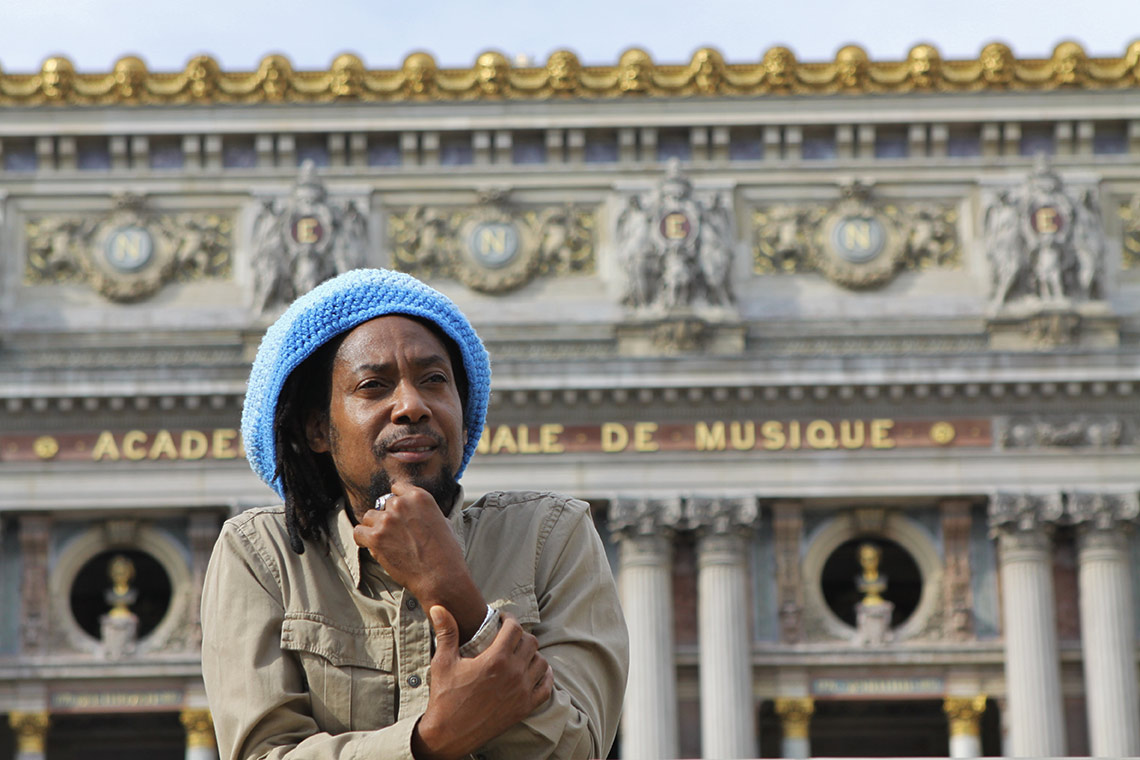
Where were you at conceptually for that first album?
I was nowhere! I was scattered. I was unsure, I was afraid, I was everything. I named the album Hope and Doubt because I was hopeful and I was doubtful! I was like “Are you sure you can do this? Are you really sure you want to do this?” The people around me were having the same amount of emotions like “I don’t know about that part” or “Are you going to quit everything to do that?”
But we put it out and I remember I was petrified. I was sitting at home on Saturday and then I got a call and I picked up the phone and somebody said “This is Terry Wilson from WBAI” and I was like “Are you fucking kidding me? What joke is that?” And the guy said “No, no, no - it’s me, I’ve got the album at the radio station and I really love it”.
Now BAI has a programme called Midnight Ravers. These brothers do everything from James Brown to Dylan to Santana and they do a lot of reggae. They are like the voice that gave Steel Pulse the entrance into the US. Because they played them all the time. And they’ve won about 24 radio awards because if you live in the city you know about BAI.
And the brothers started asking me about myself and where I was from and when I told one of them who I was, I realised that he was my neighbour when I was growing up! Because I remember he had a dog, a German Shepherd, that got hit by a car. In that time nobody cared about dogs. It was a Caribbean thing. People threw stones at them and to an extent it still happens now. And the dog got hit by the car, it was lying in the street bleeding, and he picked it up and he was crying and I’ve never forgotten that. So when he told me who he was I reminded him of that story and he was like “Oh my God! Somebody remembered that story!”
So he loved it and he brought me in and we did a four hour special on the album. And then about two weeks after I got another call and it was Dermot Hussey. Dermot called me to say he had been listening to the album and he liked it. And he started playing it. And then not too long after that we got a review from a magazine called The Beat. And it said “If ever there was a group that absorbed to the roots rocking throb of the Wailers it would be Taj Weekes and Adowa on Hope and Doubt”. And I broke down. I started to cry. Because now somebody else had validated that I could do this.
I first heard you on your second album DEIDEM. I heard the Wailers connection but without any of what have become clichés through relentless copying. The song For Today has this extraordinary use of monumental opposites creating a sense of paradox. “The latter days of have come, the ending has begun, beginning’s on the way, hold on for today”.
After the first album was done, I was so confident. I think I went in the studio with too much confidence. I think I thought that by the time we got round to DEIDEM that I had figured it all out you know? But when I went in and I realised I wasn’t as confident as I thought. But DEIDEM came really easy because when I had written Hope and Doubt we had written two albums. Because I was so afraid of not being able to make a second album because you always hear about “Oh they could only make one album, they can’t do the second album”. So I’d written the first album and I kind of had the ideas for the second album and I was determined to make the second album, in my estimation, better than the first.
But I have to tell you that when I was doing the shows at Lion’s Den a lot of people were giving the Bob Marley comparison and I didn’t like it. For some people it might have been a wonderful idea for people to tell them they sounded like Bob but I hated the fact because always kind of wanted to be me. My mother would always tell me “You’re unique. You need to do your thing. Don’t follow anybody”. The song Angry Language is basically how my mother was always saying to me “Be in it but not of it. Seek the spaces in your thought”. So when I decided to make the first album I was trying so hard not to sound like the Wailers but still people made the comparison.
When the DEIDEM was done Cat Coore wrote to me on MySpace and told me that he had been listening to DEIDEM and it was one of the best albums that he had heard in a while. And that meant so much to me. Because you grew up playing the drum roll for 96 Degrees in the Shade on your geometry set. So there are the people that I grew up listening to calling me to say or writing to me to say “Yo, we dig what you’re doing”. That’s why I always try to call the young people who play music in Saint Lucia to just kind of give them a boost. Because you’re not aware of how much of a boost it is to somebody who is coming out for an elder person to say “Yo, you’re doing good. Keep on doing what you’re doing“.
Yes because that person could be on the verge of quitting…
Yeah I’ve been there lots of times!
Your third album A Waterlogged Soul Kitchen (a reference to Hurricane Katrina) includes the song Shadow Of A Bird which illustrates another of your signature methods. An incredibly gentle lilting soothing rhythm delivers an absolutely brutal reality message.
Yeah, you know somebody told me last week [about the new album] that they never heard Son Of A Bitch sung so beautifully! (Laughs) I think that’s the only way you can get these messages across. You’re trying to make the sweetest melody to carry the heaviest message. That’s the only way you can get people to listen to it. So it’s a deliberate effort on my part. The harsher the reality, I tried to make it as smooth and silky as possible. So it’s digestible.
On your next studio album Love Herb And Reggae you used the song Here I Stand to talk about homophobia, a topic many reggae artists stay away from these days. There have been a few other Rasta artists who have sung about it – Jahmali and Apple Gabriel - but they have all been outliers from the main Jamaican reggae scene.
I really don’t care about being part of any scene. My job is to write songs and to be as true to the art form as I possibly can. If money and fame should come out of it then so be it. But I would not want to be sitting back in my 70s thinking “Wow I made a lot of money but I just sang stuff that I never lived or believed in”.
When I made that song Here I Stand it was because I had gone to SXSW and some journalist refused to interview me because she said I was homophobic. Just because I had locks. And I remember getting on the plane home and it bothered me. It bothered me that not only am I not homophobic but because I had not spoken about it I became complicit. I was saying that to my son and he said “Dad what are you going to do about it?” And I said “You know what? I need to do what I do. I need to write about it. Because that’s the only way the people are going to know what I defend.” Understand I’m not defending anyone in this song. I’m telling you where I stand. It’s not my duty and not my responsibility and not my business to tell another grown person what it is that they should do with their life. And I think we’ve made criminals of people who haven’t committed any crime. It’s the same way I see smoking weed. If nobody is hurt, why is it a crime?
But that’s the reason why we have our own label. Because I want to say what I want to say, when I want to say it. I don’t want to have somebody dictate to me what I can or cannot say. And when that song came out and we put out the video - in my inbox I got called every name there was. I could have written that song before but mentally I was not in a place to take the abuse that came with it. But by the time Love Herb and Reggae came about I was in the space like “I really didn’t care what they think. This is what I think”. And I said to people “I don’t write songs because I want to say something. I write songs because I have something to say. Here I stand.”
And the main part of the song that everybody forgets is “We been talking much of love, but is it wrong to love another because it’s not your kind of love? Be kind to love. Divine is love. Resign to love.” We speak about “One love, one love, one love, one love” but we want to tell people how to love. I truly believe there are more people, more Rastas, more reggae singers, who feel the same way I do but their money is on the line and their life is on the line. Because it can become violent if they say what it is they need to say. So for some people I said it for them and I think years down the line you hear people saying “Oh yeah man, he was bold enough to do it”.
It’s interesting because they were songs by female artists earlier. Tanya Stephens’ Do You Still Care for example. But because this hatred is so bound up in ideas about masculinity, somehow it’s different if a man says it.
Yeah, I remember the Tanya Stephens. Yeah and I guess the nature of my voice too. Because this is really funny. A guy said “Yeah I knew you were a faggot. Look at the way you talk”. (Laughs) But like I said, if I had been in a different place in a different time I probably would have been offended by it. But as long as it’s creating a conversation it’s done its job. That’s what it supposed to do. Provoke thought and create conversation. So I’m proud of the song for that.
I really like the new album To All My Relations. You’re still sticking to the same principles that you worked by but the songs are catchier than on Love Herb and Reggae.
The thing about the last album is I did the last album differently. I’ve built the album around the chords. I was trying to not have the two or three chord song. I mean I got a little carried away on Here I Stand. Here I stand had I think 47 chord changes! I was trying not to be bored with my stuff. I was trying to expand the art form. I can sit at home and I can make tons of two chord songs. But as a musician it gets a little boring. I have told people my intention is: when I’m done for my children to look back and say “Dad you were never gimmicky. You did what you had to do. You carried the message”. So yeah and then I did this album… You see we had written another album.
In your interview with my colleague Maliika Walker for Island Stage magazine you talked about how your experiences at Standing Rock and Cuba meant you changed direction.
Yeah I had written a completely different album with 13 songs. But Standing Rock and Cuba just fucked up everything! The songs on this album just came flooding in. We were in North Dakota - it was -24, -25 degrees. I remember having a cup of water in my hand, the cup fell and I slid on the ice immediately. That's how cold it was! We had a day off between North Dakota and Canada and somebody said "We have a day off why don't we go to Standing Rock?” Our guitar player Jafe knew somebody at Standing Rock and he made the call and we went to visit Standing Rock.
Standing Rock was scary for me but it was exciting at the same time. When we were coming in, the GPS led us was down this lonely park and there was a sign in the gutter that said “Do not enter” but we entered because the sign was in the gutter. And when we got down the street there was a police presence and they pulled us over. We had a car and they searched everything, they gave us some tickets that were not warranted. But they gave us tickets because we said we were going to Standing Rock. And they gave us a different route which was a longer route. They asked why we were going to Standing Rock and we answered their questions.
When we got to Standing Rock and were coming in, up on the hill were the FBI sharpshooters. It was scary because the shooters were there but because of the energy of the people who welcomed us you were caught between fear and excitement. We got out and people were talking and brothers were hugging. There were people from all over the world. It was the first time in my life that the cold had literally taken my breath away. It was so cold and so breezy that I could not inhale. So we all had to put the little coverings over our noses and mouths so we could actually breathe.
We brought our guitars and we went into the kitchen which was the central place where everything happened. We got to meet some of the elders and there was just so much love in Standing Rock. I have said this before but I would stand in minus 24 degrees only for certain people. They told us their stories about how they were being wet in that kind of temperature and I was thinking “Why don't you just go home?” And then I sat back and realised “This is what love is”. It's easy to love your family but not total strangers and stand up for principle, to fly in from Australia, England, France to support a cause that was bigger than themselves. And it took love to me to a different level.
It was the first time I had ever gone live on Facebook because I was so moved by Standing Rock. We sang some songs and every time people gathered in a circle and somebody was about to say a prayer they would say “This prayer goes out to all my relations”. I loved the idea that you could say a prayer that invited and included everybody all the time. I said to the lady who was standing next to me who was a journalist “When I make an album the next album I'm going to call it To All My Relations.”
And all the time the intention was to make it after the album we were planning. We left and I just kept writing the songs. We left the tour and came back to New York and then we went to Cuba. Cuba kind of really threw me off because after all the shit I had been told about Cuba, it was nothing like what I had been told. Cuba was cultural and proud and artistic and everything was not what I expected from all the propaganda. And then I started writing some more songs. So between Standing Rock and Cuba I had written 28 songs. I came back and presented 22 to the band and they chose 15. So we had 15 songs on the album.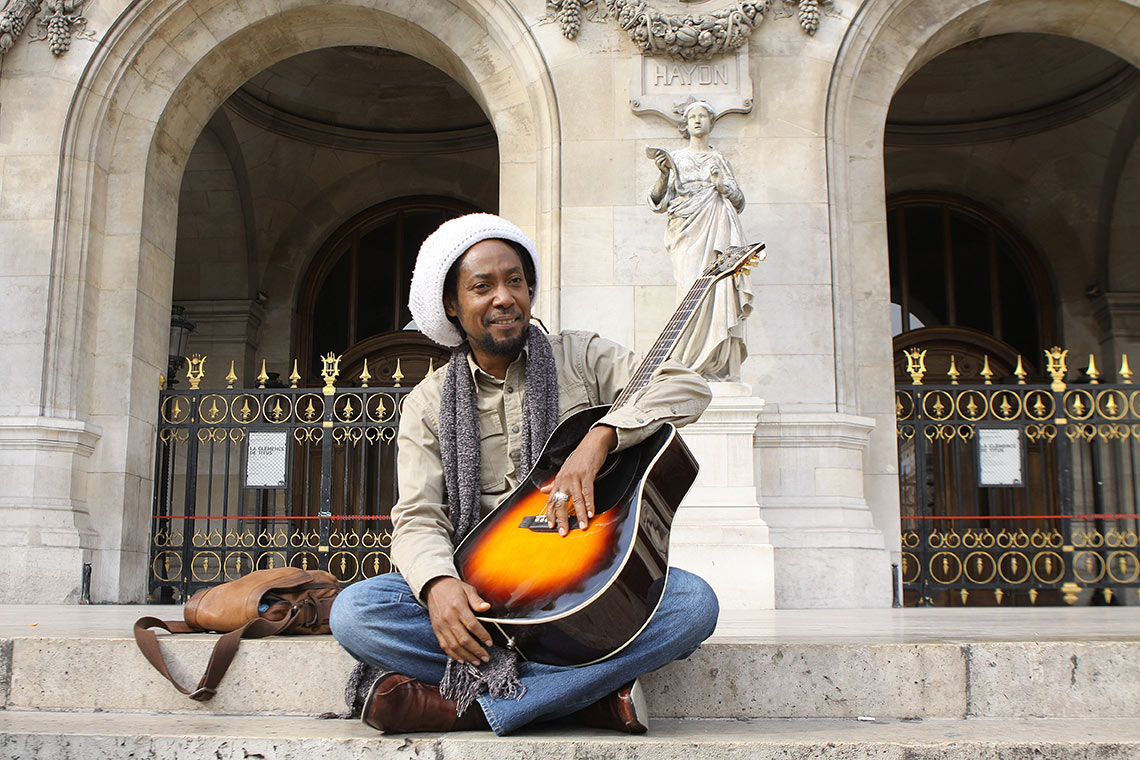
For this album you worked with a producer, Sidney Mills from Steel Pulse. Steel Pulse are also outliers from the Jamaican reggae scene who eventually went international. Wasn’t Sidney originally going to produce your previous album Love Herb and Reggae?
Yes, Sidney and I knew each other because Sidney for the most part lives in the city. We always passed each other on the road. We'd always say “Hey we've got to do some work together” but the chances on our schedule was always a difficult thing. But on this album I knew I didn't want to go back in and do what I had been doing before. I needed to get something that sounded different.
So I called Sidney up and he said “Yeah bring it down, but I'd like to come to rehearsal because I want to be part of everything. I don't want you to just show up with the songs already set in stone.” So I went over to him with my acoustic guitar and I showed him the direction I was going. The band rehearsed the songs for a while and he would call every now and then to say “Hey don't forget when you're doing it to think about this or think about that”. We came into his space and we played the songs for him and we just took it from there.
How hands on was Sidney in shaping your sound?
He shaped it, but he shaped it gently. Sidney is the kind of person who will get you to move in a direction but he's so nice about it and he validates the reason why you need to go in that direction. And I said to Sidney when I sat down with him “I need you to push me, make me uncomfortable but I can only be so uncomfortable and no more”. Because I knew I needed somebody needed to take me in a direction that I hadn't been. Somebody had to make me sing something that I would not have sung usually. And that's what said he did. He brought in the experience of Pulse and everybody else that he had worked with. But he jumped in completely. He was in from the beginning, all the way in. That's what I liked about it.
The United States is going through some difficult, chaotic times right now and you have not shied away from this on the album. Big Pharma talks about Healthcare, 41 Shots talks about police brutality, The Lie talks about Donald Trump. The whole record looks at the effects of capitalism as it starts to eat itself and spiral out of control.
Yes but this is what some artists are supposed to do. And this is my problem with reggae. Reggae I think has kind of lost its way. I know a lot of people are not going to agree with me but I really don't care. We used to be the genre that spoke truth to power. We were the genre that taught people things. I've said to people many times that when I first found out about apartheid it wasn't from a book or a newspaper - it was from Peter Tosh. I cannot think of a [recent] reggae song that has taught me something I didn't know. It's true that I am in a different place and I know a lot more now than I did back when I was a child. But we're not tackling the subjects that matter.
And the world exists in reggae beyond Jamaica. We need to sing about things in our immediate neighbourhood but we have to look beyond that too. We have to stop saying the same thing a million times over. There are lots of stories in the world. People all over the world suffer. It's not only black people suffering. It’s everybody suffering. Because we're all victims of that very same system. So the intention is always to try to put these messages out at all times. And that will always be my intention, the fame and the fortune really doesn't matter to me. I just need to be as true to this art form as I possibly can. And that's what I will always do.
You told me once that you have been accused of being an elitist. Is that still something that bothers you?
Yeah “an elitist songwriter”. Because somebody said to me “Fathomless mendacity would not be in an average reggae song”. But I felt that - and I've since changed my point of view slightly - but who are these people to tell me what reggae should or shouldn't have? Why does it have to be simple? Why does every reggae artist have to sing the same song? If we believe in an I and I philosophy then every individual has to bring his mix into the whole. Why is it that my point of view and the words I choose and the subject matter I choose to speak about are looked at differently than somebody else's? But that really doesn't matter to me anymore - what people think of me as a songwriter. What matters to me is that I should tell the story of the day, the story gets out, I'm not gimmicky and somebody gets the message.
The mainstream liberal media is twisting itself in knots trying to explain the rise of Donald Trump. They seem to be two main explanations - that he is a product of racism or a product of financial inequality in the face of globalisation. Which is he? Is he both?
He's both of them to me. The man has laid his hand out even from the Central Park jogger situation. I mean who takes out a full page newspaper ad in the New York time saying that these people should be hanged? And then when they're vindicated you don't go back and correct what it is that you've done.
I just think he gets way too much time and exposure anyway. I think at some point to people need to go to black when you hear the bullshit. It doesn't matter who it's coming from - it's bullshit. You cannot rake a forest to prevent a forest fire. That's bullshit. And people need to say it and not try to intellectualise bullshit. Trying to find some deep meaning behind something that’s as basic as what a kindergartener would say or sometimes would not even say because it's below the kindergartener. But no I just think this brother’s got me... Because he is a brother too. We're all brothers but some of us have gone astray. But he is a product of this country. It's really funny, I'm actually writing a song now that I want to just read a little bit of it to you to talk about what's happening right now. The song says:
“I remember stories of caravans of people, Travelling to the west coast for a better life, They were called adventurers, Buffalo and the gold rush was on their mind, But you may say that it all happened within the confines of one country, And I would say but they were only bridges there were no walls, And I would say that the adventurer before that, Illegally migrated to a country that he's now in, And that he killed all the inhabitants before him, They were called conquistadors, And their stories were written in a book, With a Bible and a gun that's how they came, But the more things change, the more they remain the same.”
I mean the immigration conversation is really weak. For you to have that immigration position you have to forget everything that came before you. It's sad that as soon as you cross over the bridge you want to burn it down.
You also see it with people who come from humble beginnings and become wealthy. They don't want to share their wealth. It's psychological. They want to think the system is fair because they have achieved in it.
But you know Angus my biggest thing I keep saying is that Barack Obama won an election. Even if every black person voted for him he still would have lost the election. Because black folks are only 13% of the population. So there are tons of good white people. We need to remember that in the mix. They didn't just all go bad. We know there are all these influences from other people in the election and what happened. But I think we need to always remember when we start pointing fingers when people like Donald Trump show up that there are good people in the world. There are good people and that is one of the fundamental things people need to remember.
The election is flawed because I can win more votes but you still win because of the whole Electoral College. And unless they get rid of the Electoral College you're not going to have fair elections. There is voter suppression and there are so many things going on. I mean any given time we all have anger and good in us but sometimes we need it coaxed in a particular direction. And all this brother is doing is he is coaxing people the wrong way.
And the media is complicit because they allow him to say all the bullshit and then they keep putting it out. We have 24-hour news and you can hear that shit all day. When the brother says something silly - just cut it out. But at the same time if news is for money then money wins. Because these guys only care what the ratings say. They look at the analytics at the end of the day and say “When we played the bullshit here we got more viewers”. Instead of saying “What we need to guide this place in a particular direction”.
If what happened in the election in Georgia had happened in any quote unquote “banana republic” the CIA would have been in there already. But it happens right here. It's just the hypocrisy of everything. Stuff happened in Grenada and Maurice Bishop was killed. But it's happening in Georgia and it's happening in Florida and it's happening all over and life goes on like nothing happened. But I have to tell you that this brother has given me a million songs. I would love to see reggae be that kind of vehicle that tells the story of the day like it was being told in my time. When Bob Marley did Survival.
Is funny you mention that - and I know you're not going to like this - but the song Vibe Up really reminds me of Survival. I guess that's an album that resonates with you.
Yeah man, Survival is wicked. Survival I think all the pistons were firing. And it's sad how people want to water down Bob Marley to One Love and Three Little Birds. And we’ve forgotten about Zimbabwe and Africa Unite.
Let’s not forget the verse of One Love – many people only think about the chorus.
Yeah! That's what I would love to see reggae do. I may never get to that place. Sometimes people want to hear something softer because otherwise you need to think and you need to do something about it and most people are happy sitting on their hands till they get numb. And asking “Why is it that my hands got numb?” Because you were sitting on them. And you chose to do nothing at all. But we will always say something because I tell people His Majesty said it is the inaction of us that has caused the evil to flourish. So when they go pointing fingers they can't point on me because I did my part.
And how is your charity work with They Often Cry Outreach going?
The charity is doing well. We just brought down 500 bicycles to St Lucia because we're trying to help people live a less sedentary lifestyle. So yeah it continues man. We were down there in October with dentists down in the south. We came and took care of some school children. Then we're going back in January to do the same thing we're working on trying to get bicycle lanes up in the north. So people can feel safer riding on the streets, because without bicycle lanes you know how crazy it can be. It's an ongoing thing. We're still doing the spay and neutering. So far in the 6 times we've gone we've done over 3,000 animals and we've exported over 75 to Canada and the US. So we just keep on keeping on.
So what's the album that you didn't make like and when is it coming out?
The album was actually called Damascus Road. Damascus Road will come out but it will be a little different because since Standing Rock and Cuba I have written almost 128 songs. So we're going to mix it up a little bit and the song that I just read to you may be part of it too.
PHOTOS BY PHILIPPE CAMPOS




